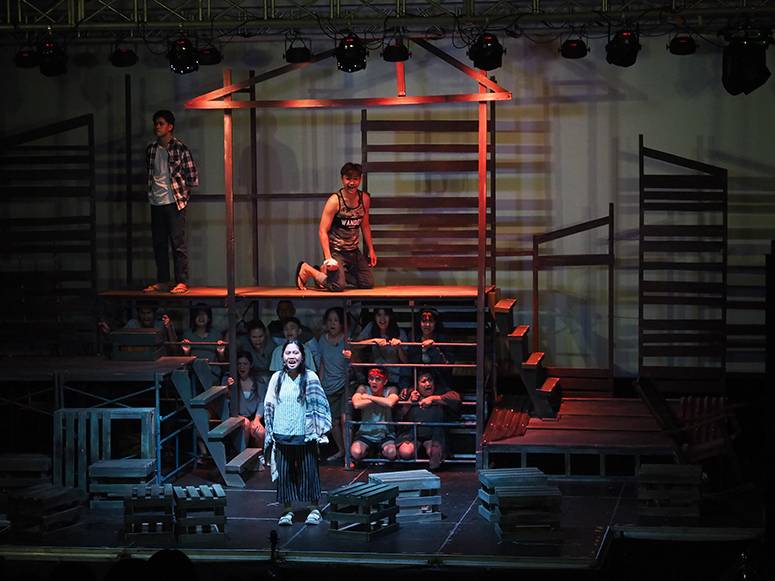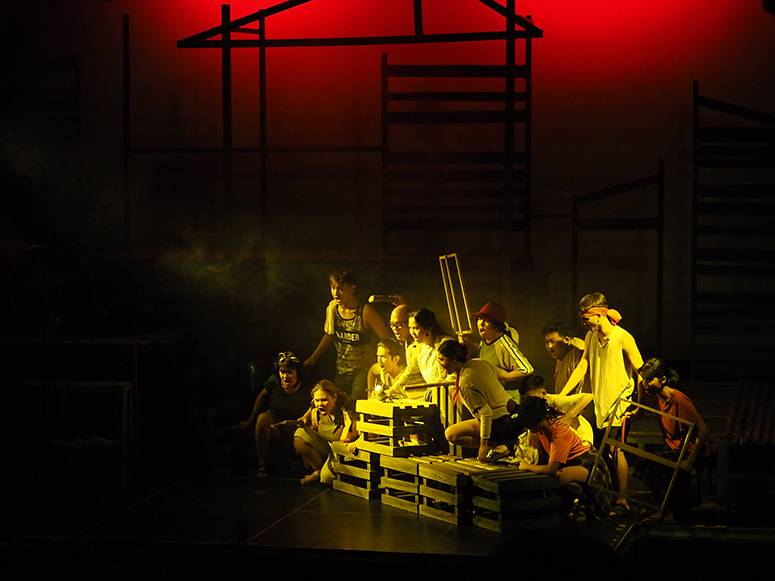Never art for art's sake with Albay-based theater company Sining Banwa
Sining Banwa is finally seeing the fruits of their labor.
In a conversation with Young STAR, Julie DM Bega, a Senior Member of Sining Banwa, takes pride in the hard work and toil that go into cultivating a province-based theater company. She credits their success to their volunteers and artists, both past and present, and the sectors they borrow their narratives from.
Since August 2011, Sining Banwa, which roughly translates to Art of the People, has been producing original plays using Bicol as the primary content, context, and methodology. Since then, their vision has been to promote alternative culture, contribute to literature, and share the stories of the people.

Sining Banwa’s thematic choices have always been deliberate. For them, theater must affect societal change; “baguhin ang maliliit na problema,” as Bega puts it. To do this, theater should never be divorced from reality.
Higit Sa Pag-ibig, a story of a family enduring the test of time and undoubtedly one of Sining Banwa’s most successful full-length plays, perfectly encapsulates this. First performed for their 10th anniversary, Higit Sa Pag-ibig portrays what it’s like being a local artist in a time when truth-telling is heavily policed.
Yung teatro, dapat nagmumulat at nagpapakilos.
However, Higit Sa Pag-ibig is but a sprout in their field. Their wide-ranging repertoire cuts across the struggles of farmers, fisherfolk, jeepney drivers, women and queer people—stories that our time demands. But telling these stories is not enough.
To remain sober in their storytelling, one of Sining Banwa’s initiations for new members is an immersion into the community. They live in their subject’s shoes. They plow land, they cast nets and they collect jeepney fares. It’s an exercise that inspires depth in their craft but also puts things into perspective and makes them better people.

“It forces us outside of our bubbles,” RM L. Bonilla, a junior member of Sining Banwa, told Young STAR during the same interview.
Our conversation stirred a distant memory for Bega. She recalled the time she spent with one of the families in the community. She got to know them and shared meals and bed spaces. That night, however, not much sleep happened because of the herd of mosquitoes feasting on her. Losing sleep then felt like a huge inconvenience. But unbeknownst to her, it was the last night she would share with the family because they were forced out of their home the next morning.
These are the stories that shape Sining Banwa and drive them into action. “‘Yung teatro, dapat nagmumulat at nagpapakilos,” Bega said.
Sining Banwa wishes for their art to teach their audience how to think, evaluate the current political climate, and inspire them to be more involved, whether it's in discourse or the community. Their art disturbs, yes. But their art also comforts their audience with the knowledge that you aren’t alone in wanting a better world.
It’s easy for petite-bourgeoisie artists to isolate their art from the world. With mainstream media readily rewarding its definition of marketable and digestible, and our societal landscape pushing awareness of the class divide to our periphery, it can be challenging to write plays that question the status quo.
For years, Sining Banwa has struggled to find the audience for their performances. There was even a time when their only audience was their family members, obligated by their complimentary tickets. Quitting would've been easier, but they remind themselves why they're performing and for whom.
Despite the hurdles, Sining Banwa finds their strength and resilience in the creative communities they have formed and become a part of, such as the Taragbo Bikol Theater Network. They also find strength in each other. For Bonilla, the joy of being surrounded by his colleagues who are just as passionate, if not more, is what keeps him going.
As our conversation went on, Sining Banwa never failed to mention the different communities that helped them get to where they are now—the same communities who, despite financial constraints, once paid for their performances with root crops and bags of rice. They also remember the past members who left but have collectively laid the groundwork for them. “Without humility, Sining Banwa would cease to exist,” Bega said.
For this reason, as they reap the fruits of their labor, Sining Banwa never fails to remember to give back.

Their latest performance of Higit Sa Pag-ibig: The Musical, a dream collaboration between them and The Dawani Project, funded a mobile school library. Likewise, this year's Pista Nin Teatrong Bikolnon, their annual celebration of the art form, amplifies the critical calls on pressing issues like climate change, poverty and marginalized sectors, gender rights, education, healthcare, and many more.
With the theme “Eksprés, Amplifying Urgent Calls,” Sining Banwa continues to position themselves within the community. Since Pista Nin Treatrong Bikolnon's commencement, they have created a space where artists get recognized and important conversations take place.
But there's a lot more to do for Sining Banwa. They’re still planting the seeds of their dreams.
They wish to stop the romanticism of the “starving artist” trope and for theater to become a stable source of living. Aside from the Black Box— their existing creative space for their performances and rehearsals—they also wish to have a much bigger shared space with other artists in Bicol.
Beyond performing new and original plays, they dream of conducting research, to remember and legitimize the history of theater in the region. Above all, Sining Banwa hopes for Legazpi City and Albay to become a significant home of Philippine theater outside of the national capital region.
Sining Banwa's journey has not always been on fertile ground, but they will always remember that their purpose is to serve the people. “Ang sining ng bayan ay sining mula sa bayan at sining para sa bayan.”


